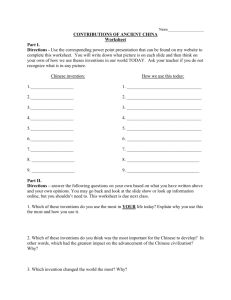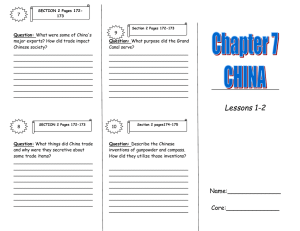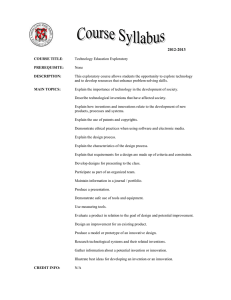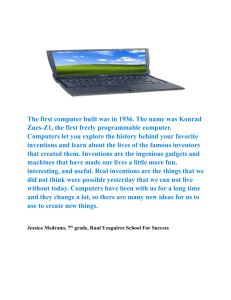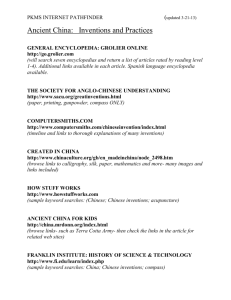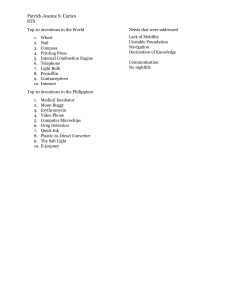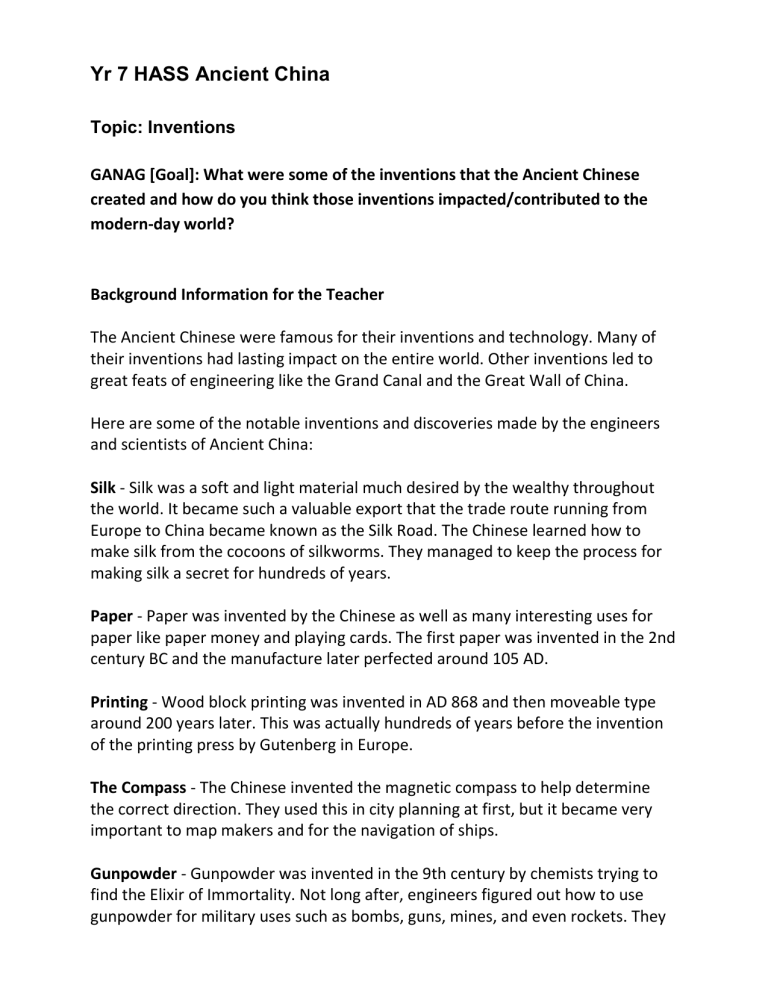
Yr 7 HASS Ancient China Topic: Inventions GANAG [Goal]: What were some of the inventions that the Ancient Chinese created and how do you think those inventions impacted/contributed to the modern-day world? Background Information for the Teacher The Ancient Chinese were famous for their inventions and technology. Many of their inventions had lasting impact on the entire world. Other inventions led to great feats of engineering like the Grand Canal and the Great Wall of China. Here are some of the notable inventions and discoveries made by the engineers and scientists of Ancient China: Silk - Silk was a soft and light material much desired by the wealthy throughout the world. It became such a valuable export that the trade route running from Europe to China became known as the Silk Road. The Chinese learned how to make silk from the cocoons of silkworms. They managed to keep the process for making silk a secret for hundreds of years. Paper - Paper was invented by the Chinese as well as many interesting uses for paper like paper money and playing cards. The first paper was invented in the 2nd century BC and the manufacture later perfected around 105 AD. Printing - Wood block printing was invented in AD 868 and then moveable type around 200 years later. This was actually hundreds of years before the invention of the printing press by Gutenberg in Europe. The Compass - The Chinese invented the magnetic compass to help determine the correct direction. They used this in city planning at first, but it became very important to map makers and for the navigation of ships. Gunpowder - Gunpowder was invented in the 9th century by chemists trying to find the Elixir of Immortality. Not long after, engineers figured out how to use gunpowder for military uses such as bombs, guns, mines, and even rockets. They also invented fireworks and made great beautiful displays of fireworks for celebrations. Boat Rudder - The rudder was invented as a way to steer large ships. This enabled the Chinese to build huge ships as early as 200 AD, well before they were ever built in Europe. Other - Other inventions include the umbrella, porcelain, the wheelbarrow, iron casting, hot air balloons, seismographs to measure earthquakes, kites, matches, stirrups for riding horses, and acupuncture. Fun Facts Gunpowder, paper, printing, and the compass are sometimes called the Four Great Inventions of Ancient China. Kites were first used as a way for the army to signal warnings. Umbrellas were invented for protection from the sun as well as the rain. Chinese doctors knew about certain herbs to help sick people. They also knew that eating good foods was important to being healthy. Compasses were often used to make sure that homes were built facing the correct direction, so they would be in harmony with nature. The Grand Canal in China is the longest manmade canal or river in the world. It is over 1,100 miles long and stretches from Beijing to Hangzhou. They invented the abacus in the 2nd century BC. This was a calculator that used sliding beads to help compute math problems quickly. A clear coating called lacquer was made to protect and enhance certain works of art and furniture. Paper money was first developed and used in China during the Tang dynasty (7th century). Activity Below are a series of Five cards. Each of the cards is an Ancient Chinese invention. Either print them out on A4 paper, or display them on the Smart Board and ask students to consider what each one might be. Allow them a moment to think or discuss amongst themselves before giving the answer away. N.B** Be sure to briefly discuss the purpose of each of the items and how they have evolved over the centuries to become useful objects in the modern-day world. Answers to the Cards; A. B. C. D. E. Seismograph Playing Cards Gun Coins Paper Money Year 7 HASS - Ancient China; Inventions Assessment Task Your task is to research two Ancient Chinese inventions and link it to the dynasty that was responsible/in power when it was created. This can be completed individually or with a partner, the presentation must be digital. Select Two of the Following Inventions: 1. 2. 3. 4. 5. 6. 7. 8. 9. 10. 11. 12. 13. 14. 15. 16. 17. 18. Paper Making Movable Type Printing Gunpowder Compass Alcohol Mechanical Clock Tea Production Silk Umbrella Acupuncture Iron Smelting Terracotta Warriors Great Wall Porcelain Rocket The Kite The Seed Drill Paper Money Your presentation will need to include the following: · · · · · A suitable introduction to your topic A description of the invention A description of the dynasty in control when the invention was created Images, diagrams etc… to support your work A bibliography MUST be included Presentation Planning Sheet WHO? (created it and which dynasty) WHAT? (What is the invention?) WHERE? (location, for example a particular province or capital) WHEN? (approximations are OK) WHY? (What was the purpose of the invention, did its uses change over time?) HOW? (How was it created? Was it accidental? How did the people made this item?) 2019 - Term 2 - Year 7 Humanities Dynasty and Key Invention Presentation Emerging Developing Proficient Broadening Advanced You have attempted to address the topic at times, though much of your information is simplistic or irrelevant. You have attempted to address your topic and answer each section. Sometimes your information could have been elaborated. You have answered each section with accurate information using relevant supporting visuals. You have provided accurate information in response to the assignment including relevant supporting details that add complexity and demonstrate detailed understanding of the topic. You have provided highly sophisticated information in response to each section, including relevant supporting details which add complexity to your understanding of the topic. No bibliography was included Bibliography was included but not correctly structured. Bibliography was included. Bibliography was included showing a variety of sources. Bibliography was included showing detailed research. You have not displayed an understanding of 12 dynasties and inventions. You have not analysed any sources. You have displayed a limited understanding of 1-2 dynasties and inventions. You have analysed one primary source. You have displayed some understanding of 1-2 dynasties and inventions. You have analysed one primary source. You rarely made eye contact with your audience and looked uncomfortable throughout the presentation. Try and be more prepared next time and use cue cards to help with your confidence. During some points in your presentation you connected with your audience through physical cues, such as eye contact. Sometimes you looked at your notes for too long. You used eye contact and alert body language to engage your audience most of what you were presenting. * ** Historical Skills Historical Knowledge You have displayed an adequate understanding of two dynasties and inventions. You have analysed more than one primary and secondary source. You have displayed an indepth understanding of two dynasties and inventions. You have analysed a variety of important primary sources and secondary sources. Presentation Oral Presentation You spoke without needing to look at your notes very often. You displayed consistent ability to maintain your audience’s engagement through frequent eye contact as well as alert and comfortable body language and voice. Your voice and body language was highly engaging and you used frequent eye contact. You spoke confidently about your topic and your accompanying media was engaging. You proved to know a lot about your topic from memory. Presentation/visual support. *** **** *****
